I was attracted to Hoi An after reading a few articles about this charming, well-preserved historic town halfway down the coast of Vietnam. I last visited Vietnam in 2011 and fell hopelessly in love with the cuisine, so when I heard that Hoi An is considered to have the best food in Vietnam, the decision was made. My idea to visit Hoi An was further supported by a few digitally nomadic colleagues who generally had great experiences there. (See also: Digital Nomad Life in Chiang Mai)
Unfortunately it wasn’t until almost the end of my time in Hoi An that I got into a groove and began to understand more about expat life in Hoi An, and why (and how) people who come, often stay for many years. Instead, I wrestled with the place, eventually truncating my stay and leaving (earlier than intended) after six weeks.
Here’s what happened, and what I learned about expat life in Hoi An.
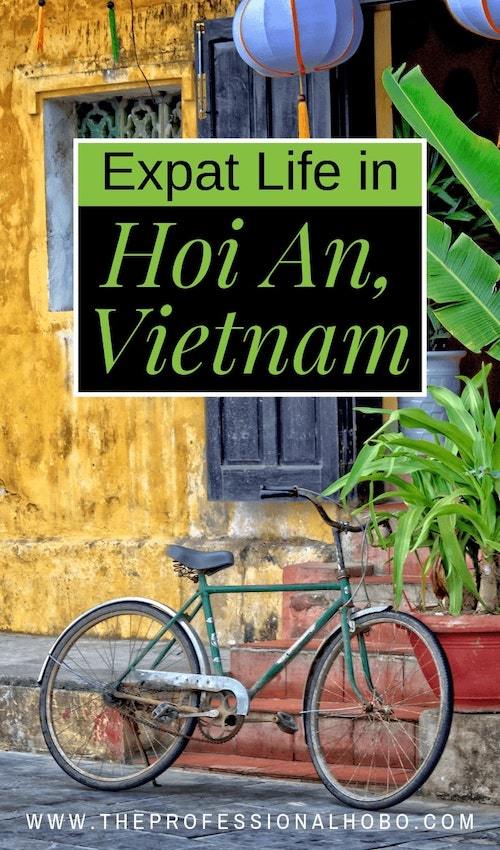
Weather
I had no idea just how dramatically the weather in Hoi An was impacting my mood until it improved (after I’d already made onward plans of course).
“Hoi An really is a different place when the sun shines,” said my expat neighbours when I was lamenting one day. A solid month of grey skies and chilly(ish) temperatures had severely affected my mood. (Silver lining: it confirmed that I have no business ever living in a place where the sun doesn’t shine regularly).
But I didn’t really believe them until the sun eventually showed itself. Not only did my own mood improve, but so too did the dispositions of everybody else. The energy of Hoi An literally changed in a day, as did the scenery; a formerly drab townscape took on a new personality and colour.
My neighbours told me so. “Hoi An is three months of misery, and nine months of sunshine,” they said. Lucky for me I was there in January/February, at the tail end of the miserable season, so the constant rain and floods already had their way with the place. That, I wouldn’t have survived.
So if I can recommend a time of year to go, it would be between March and July, before the suffocating heat of summer sets in, followed by the onset of the rainy season. “Three months of misery, eight months of sunshine, and one month of ridiculous heat,” is how another expat explained Hoi An’s humid climate, further describing the hottest time of year as pretty unbearable, which happens around July/August.
Where to Stay in Hoi An: Choice of Neighbourhood/Transportation
Finding accommodation in Hoi An was relatively easy. We booked a place (through Booking.com) for the first few nights on arrival, and searched on foot for places to rent by the month. There are a few Hoi An Expats Facebook groups, one of which is dedicated solely to properties for rent and sale. In a day, my boyfriend and I had toured two self-contained apartments that fit our needs and budget.
One was brand new (like the many places being built for short/medium term rental purposes in Hoi An at the moment), on a busy street, and about a 10-minute walk from the historic old town of Hoi An (for $350 U.S./month all-inclusive). The other was part of a family compound in the quiet neighbourhood of Cam Thanh (on a rice paddy!) a 50-minute walk from the old town (for $300/month + utilities). The neighbourhood had a local fresh food market with a number of vendors selling hot/prepared foods, which at first glance appeared to have plenty of variety.
Given that we had just spent two months in a busy area of Chiang Mai, we chose the quiet more rural location of Cam Thanh.
(See also: How to Find an Apartment in Chiang Mai)
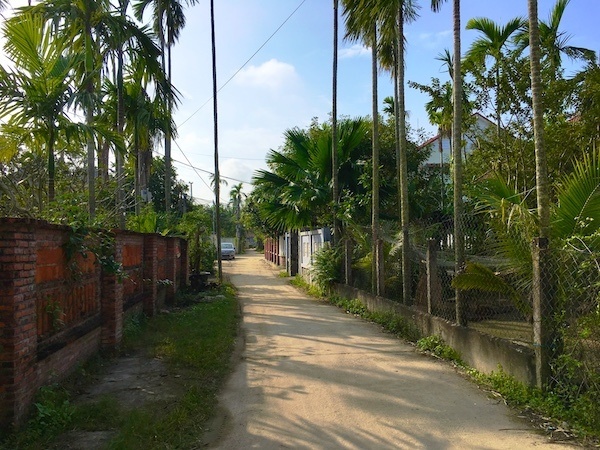
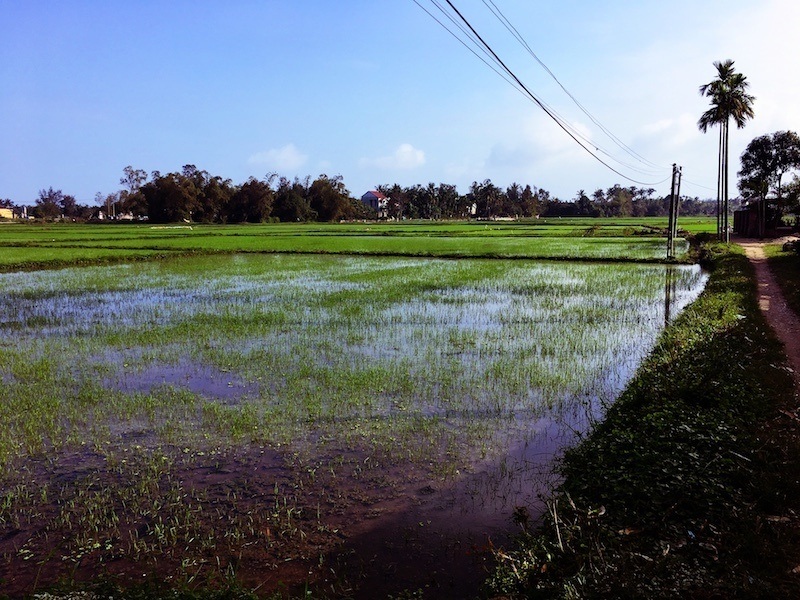
Are you looking for accommodation in Hoi An? I thoroughly recommend Booking.com. Check out some of the latest deals below!
Booking.comThe problem with living rurally was, in keeping with my pattern of counter-intuitive living in Ubud and Chiang Mai, we also didn’t rent scooters, which is how everybody in this part of the world gets around. Given my own experience in a near-fatal accident in Grenada, and my boyfriend’s total lack of experience on two wheels, it just didn’t seem like a good idea. Besides which, we like to walk, we didn’t figure we’d need to visit the hustle and bustle of central Hoi An that much, and we could always Uber for about $2 each way.
Given our lack of scooters, our choice of rural neighbourhood was a mistake. We found ourselves isolated – logistically, culturally, and gastronomically.
Taking a yoga class or doing much of anything in the centre of town became too much of a “trek” to bother with on a regular basis.
Because we were living rurally and very locally, almost nobody spoke English, and we discovered Vietnamese to be a horrendously difficult language to learn and understand.
And the local selection of prepared foods at market vendors (which we had largely planned to subsist on) turned out to be quite limited.
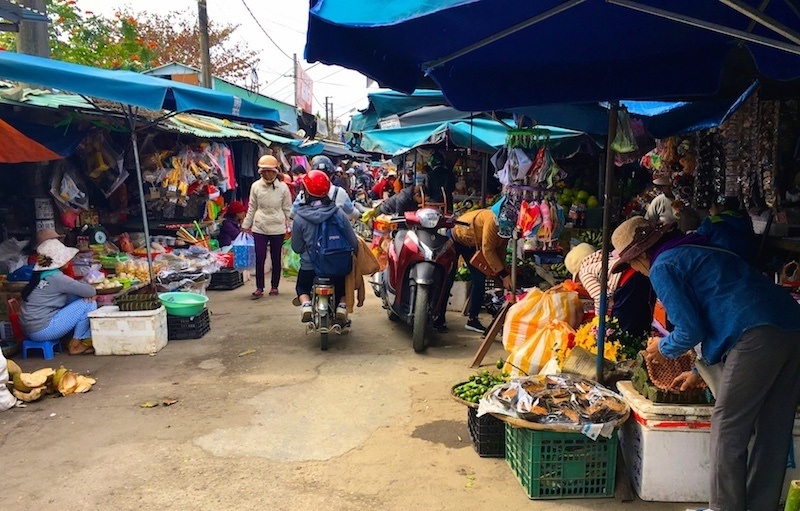
And after my boyfriend suffered a rough bout of intestinal illness requiring antibiotics, western food was all he craved, which wasn’t particularly available in our hood. Except for one place……
The Dingo Deli Bubble
I read about Dingo Deli before arriving to Hoi An, as being a deli/restaurant/market with a selection of groceries you can’t generally get elsewhere (like imported cheese and meat and high-quality breads baked on-premises), and a very location independent-friendly atmosphere with great WiFi, lots of outlets, and even a “co-working” quiet room. (For digital nomads, it’s also worth noting that Hoi An has an official coworking space called Hub Hoi An. I didn’t go because it was a bit out of the way for me, with Dingo Deli so close).
It’s a foreigner joint through and through, featuring a western menu with western prices. You’d think the prices would keep people away (when a local Vietnamese banh mi sandwich costs less than $1, why would you pay $7 for a deli sandwich?); instead, the place is packed, all the time. I would know; I was among the ranks who made it a regular hangout and informal office space, often camping out for hours at a time. Why? Because it was the only place in walking distance of where I lived that was truly comfortable, well-equipped, and welcoming of people wanting to work and hang out.
And I learned over time, it was also a hub of expat life in Hoi An.
Learning About Expat Life in Hoi An
On my last full day I was seated at Dingo Deli when a man (who I’d seen there many times prior) approached me. “Do you live in Hoi An? I’ve seen you here a few times. I’m Syd.” (I’ve changed his name here just in case he wasn’t interested in eternal fame on my website).
“I’ve been here for the last six weeks (if you can call that living here), but I’m leaving tomorrow,” I replied.
After remarking on the unfortunate timing of our introduction, we chatted about our respective paths to and from Vietnam. He has been living in Hoi An off and on for 15 years, working the odd contract abroad (as a consultant), but always returning to Hoi An.
For Syd, life is easy in Vietnam. “I keep thinking ‘maybe I’ll try another place’, but Hoi An is where I always end up. You can live comfortably for $1,000/month. The weather is hot at times, and the rainy season is a drag, but on the whole the climate is a lot nicer than many other places. And you can really get stuff done here.” By ‘getting stuff done’, Syd was referring to Hoi An as a relatively untouched marketplace. He recently helped a local restauranteur launch a book which ultimately made a bigger splash than it could have in other more saturated markets abroad.
Gordon, the owner of Dingo Deli (a smart man who does the rounds daily and gets to know all his patrons, making the place a community rather than just a restaurant) is testament to the untouched markets of Hoi An. Eight years ago he brought his wife and two daughters to Hoi An from Australia, in an attempt to raise their girls in a non-suburban environment, away from a traditional school system and consumeristic lifestyle. His daughters are now almost grown and he feels he has succeeded in his mission. (On that note, I was surprised at the number of expat families with children I saw whilst in Hoi An).
In the last eight years, Gordon has dabbled in numerous businesses, and although he said it isn’t easy to run a businesses as a foreigner in Vietnam, it can be done (and judging by the constant stream of expats in and out of Dingo Deli every day, it can also be quite lucrative).
Syd and Gordon are both among the many ranks of expats who have made lives for themselves in Hoi An (and to a larger degree for other expats, Vietnam on the whole). The expat community in Hoi An is extensive, but feels small. With places like Dingo Deli (and other similar establishments, which you’ll discover after lurking the Hoi An Expat Facebook group), expats congregate and mingle to form a tight-knit community. When Syd and I finished our conversation, I watched him go on to greet and chat with half a dozen other expats, all of whom knew him by name.
The Visa Situation
While Gordon operates on business visas, almost all the other expats I met lived in Vietnam on tourist visas, skipping the border every three months to renew. When I asked Syd if he’s ever had trouble at immigration after 15 years of visa stamps in his passport, he shook his head. “No problem at all,” he said. This surprised me, given that many countries start to question your activities after a few visa runs.
What fascinated me was the number of expats who were able to find under-the-table work in Hoi An. Working online is one thing; waiting tables or teaching English is quite another; in a country like Vietnam, there’s no mistaking who is a foreigner and who isn’t. And my assumption that Vietnam would be strict about this (being a communist country and all) seemed to be misplaced.
I met travelers who were waiting tables to supplement their travel budget for anything from weeks to months. And I met full-on expats who had homes and roots in Hoi An, earning a full-time living at English schools.
So, if you’re interested in sampling expat life in Hoi An yourself, no problemo. Give it a whirl.
Cultural Integration in Hoi An
Cultural integration is a touchy topic among travelers and expats, and something deserving of a more in-depth exploration (coming soon). After almost a solid year of bouncing around Asia (Japan, Indonesia, Hong Kong, Macau, Sri Lanka, India, Thailand, and Vietnam), I can say that local cultural integration in Asia in general is incredibly difficult. With language and cultural barriers that are difficult to understand and transcend, you have to stay a long time and work very hard to be accepted. Although on the surface I found Vietnamese people to be hospitable and friendly, it was also somewhat superficial. I doubt that people with western backgrounds could ever truly be considered “local”. My own experience of living “off the beaten track” in a local community was more isolating than rewarding.
That’s where expat life in Hoi An comes in, providing a greater sense of community that’s lacking for foreigners. It’s not for lack of respect of the local culture by any means; rather, I see the bonding of expats as an outlet for connection – often, a deeper connection than the bonds we create in our home countries where we tend to take connection for granted. And frankly, in a greater world where connection is suffering everywhere we go due to our digital afflictions, perhaps a little in-person expat connection isn’t such a bad thing.
Given that my attempts to integrate by living locally were a bit of a flop, ironically, the most connected I felt in Hoi An was when I did a tour. Although hardcore “travelers” eschew tours as pre-fab non-local experiences, I learned more in one morning of touring Hoi An’s fresh market with a bilingual local and later cooking a meal with her, than I did in the rest of my six weeks.
Seriously. Consider taking a tour. You’ll learn a ton.
My Take on Expat Life in Hoi An
I ruminate in another post about expat life in general (pros and cons) given my experiences around the world, and the intersections between “travelers” and “expats” therein.
With regards to expat life in Hoi An, I can say that by the end of my six weeks there, I had discovered a small but thriving community of expats from around the world who were living an inexpensive and socially fulfilling life – though not particularly a life of true cultural integration; something that I believe is difficult – if not impossible – in Asia.
If you want to give expat life in Hoi An a whirl, (learn from my mistakes and) give yourself the best chance of evaluating the place fairly by arriving at a climatically favourable time of year, and getting a scooter. The rest, is up to you.
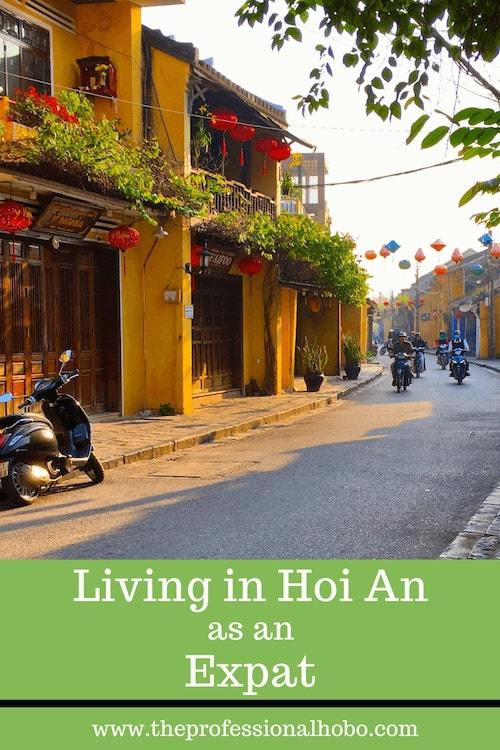



You lived in a family compound, I’m picturing a tall wall around the living areas. Am I close, how tall was the wall?
Hi Rob,
No, not at all. It’s different little self-sufficient houses on one family-owned property, where the family lived as well. There was also a pool, huge fish pond with a sitting area on top, small temple for family worship, and plants/flowers everywhere.
Did you live in Hoang Anh? Little Circus on Google maps? Where owner is Thu and so is his son….and daughter is in University? I just arrived here couple weeks ago for 3 months
Hi Tanje,
You recognize the pictures! Yes, that is exactly where I was living. Enjoy! The family is so kind. Say hi to Nadine and Andy if they’re still living there!
Hi Nora
Since I’m a bit of a weather diva, my antena perked up on the weather info, but I’m a bit confused. “Three months of misery, one month of ridiculous heat, 8 months of sunshine” but then only four-five months (mar-july) are listed as the best times to visit. Does that mean Sep-Nov are also good.?
Thanks
Hi Ian,
I remained deliberately ambiguous about that because I don’t know! Most guides etc online speak about going between March and June/July. September to November are probably also lovely, but perhaps a bit dicey with the end of the stifling heat and onset of the rainy season?? I dunno, and I didn’t clarify with any expats when I was there. (sorry)
Thanks for the great post! I found this really interesting and I loved that you included the nitty gritty details like the cost of your rent. I was just wondering, would you need to show a driver’s license to get a scooter over there? I know that many places in SEA don’t require one and I’m wondering if Hoi An is similar.
Hi Rachel,
I don’t know for sure – it would be a great question for one of related Vietnam/Hoi An/Da Nang the Facebook groups. But you’re right…if it’s anywhere like many other Asian countries, they may look the other way if the price is right….
Hello Rachel and Nora,
I’m living in Vietnam and can confirm the International Driver’s Permit is only accepted by just a few countries here, the United States not being one of them.
So I went through the process of obtaining my Vietnam driver’s license, since I purchased a motorbike here. If you drive in Vietnam without a VN license, you are 100% illegal and your travel insurance is null and void should there be an accident. I hope this helps.
Good to hear from you Nora! … I’m leaving Nha Trang (VERY happily!) tomorrow and moving to Da Nang. I spent a couple days in Hoi An last week and found the ancient town lovely, but I could never live there. Da Nang has much to offer and is a much better fit for me. Cheers!
Thanks for the intel, Allyson! Enjoy Da Nang. 🙂
Hi Nora,
I hear you about integrating. I’m in Chiang Mai for 4 months and having a difficult time with this. I met 3 lovely Thai ladies over the last month but in the last week, I’ve been pretty much dropped by them. I’m not too sure what I did to offend them….well actually I may have a few ideas :0) But it’s so strange. Perhaps you have a point when you say it all “superficial.” It’s been quite an isolating experience to say the least.
Hi Kimberley,
Interestingly when I was in Chiang Mai, I found the expat culture there so big that half the time I had to remind myself I was in Thailand!
(In case you missed it, I’m pretty proud of my article about Nimman, in Chiang Mai: https://www.theprofessionalhobo.com/wp-content/uploads/2018/01/Nimman.jpg
I wish I could travel the world like you. Looking forward to reading more of your adventures
Thanks, Aaron! There’s lots to read! 🙂
Hi Nora
Interesting article. My wife and I spent 6 months living in Hoi An during 2017. We had visited several times before and already and a few Vietnamese friends. Due to the poor weather during Dec to Feb we planned our trip from mid Feb to end Aug. One of our friends found us a house near Cua Dai Beach which was owned by a delightful Vietnamese couple. They had totally renovated and it was a modern 3 bed 2 bath house. We were completely surrounded by Vietnamese neighbours most of whom could not speak English. However, they were wonderful to us. We were invited to weddings, friends house’s for dinner and witnessed several funerals.
Every day we went to the local market and were well known there. We bought bikes and used them a lot including cycling to Hoi An Old Town (7kms) once a week. Most of the time the weather was great but we did have extremely hot weather from mid July til we left. For anyone considering doing similar I would thoroughly recommend it. I am also willing to offer any advice should it be required.
Thanks for sharing your experience, Jeff!
I was staying in a rural area of Hoi An (Cam Thanh), which, like your experience, was also a lovely way to be immersed in a very local scene. There are a lot of places being built/renovated to accommodate renters, all over Hoi An! This makes it a great place to stay for a few months (or longer).
Is there anything you would do differently about your stay if you were to do it again?
Hi Nora thanks for your response. Hoi An has changed over the 8 years we have been going there. As you say lots of new building. We rented a holiday villa in Cam Thanh 4 years ago but only for 10 days. During that trip we made a few local friends. So I would recommend that if anyone is considering a long stay that they maybe rent a holiday home first.
We originally planned to find a place in Cam Thanh among the rice paddies but there was nothing suitable available. Hoi An House Real Estate
have good reviews but they were not much help to us. In the end though we were really pleased to be near facilities as getting taxis sometimes proved difficult. I do not have a motor bike license and decided not to chance hiring one. Lots of Westerners do hire motor bikes without a license but if you have an accident there is no insurance cover. So one thing I would consider is getting a licence. I would also make a better attempt at learning the language. Other than that I cannot think of anything else we would do differently.
It was a very memorable 6 months and we would not hesitate to do it again.
Thanks for your observations and advice, Jeff!
While I DO have a license, I chose not to ride in Hoi An (or anywhere in Asia, for that matter). Too many foreigners who don’t know the roads (and like you say, don’t even have licenses) are on bikes on these roads in countries with a very different style of driving. It’s NOT a recipe for a smooth/safe ride in my opinion. (Granted, I’m once burned and twice shy: I was in a serious accident on a scooter in the Caribbean).
As for learning the language, I never made it past the basic niceties, which admittedly the locals loved. But so many phrases that I learned phonetically and repeated verbatim weren’t widely understood….the accent is almost impossible to decipher, with so many vowels and different pronunciations.
I doubt you have a license for Vietnam. They don’t accept international ones. I’m moving to Hoi An or Da Nang in 2 months. Are you still there? If not, how was the totality of your experience?
I and my girlfriend found a beautiful house through https://www.facebook.com/HouseRentalDanang/ very good website with a lot of nice house around Hoi An and Danang
I am so glad I came across your article today as I researched expat groups in Hoi An.
I am currently in Hoi An and have been here two weeks. This is my third visit and I was considering moving here.
I have found that it just isn’t going to work for me.
I am retired and live single.
I feel isolated as the language barrier seems to restrict real deep friendships.
I had not really put my finger on my issue until I read your article; the isolated part.
The weather had been lovely with just a few days of rain so I have been out and about. It seems if you are not spending money the locals want nothing to do with you.
So, I’m off to see where the road will lead me.
Patti
Hey Patti,
Sorry that it hasn’t worked out for you in Hoi An. Indeed, I find in Asia especially, true integration with the locals is very difficult. It’s much more possible with fellow expats, but in Hoi An it’s a pretty small pool.
Good luck finding your next “home”!
PS – Here’s another article I wrote about Expat Life in general (including ironies, pros, and cons)….you may find it interesting: https://www.theprofessionalhobo.com/the-irony-of-expat-life-pros-and-cons/
Several mentions of licences for motorbikes in these answers and replies. Perhaps it’s worth pointing out that, even if you go to the trouble of taking the test and getting a licence, it only lasts as long as your visa . . . ie (generally) 3 months. This probably has to be one of the silliest laws ever, and the reason that 99.9% of foreigners don’t have a Vietnamese motorbike licence!
Hey Rob,
Thanks for the info! Seems pretty silly to me for a license to only last as long as a visa. No wonder people don’t bother!
I’ve been living in HaNoi for 3+ years, with a move to Hoi An on the horizon, and I stumbled upon your blog while perusing housing. I’m a 60 year old woman from the USA. Your Hoi An experience is very different from mine and it all hinges around the language. Language is key. If someone says ” the accent is impossible to decipher” therefore making it too difficult to learn, please please please don’t give up. It isn’t impossible to learn. Plus, Vietnamese grammar is much easier than English. You will undoubtedly find more connections with locals when you continue making the local language important enough to learn. Plus it says a lot about yourself to the locals. Refusing to learn the language but still wanting to take advantage of all other local offerings (affordable housing and food, cheap transportation, beautiful locations and climate, etc) to me reeks of privilege. This is purely my opinion based on my experiences and observations of many “expats” successfully and unsuccessfully living in Northern Vietnam. I whole-heartedly recommend to anyone wanting to live abroad, to keep trying to learn and practice the local language. Do your best to shop regularly at the local markets, and learn how to use the local ingredients first before relying on those imported familiar items. It will truly make a difference in developing friendships and creating community.
Living abroad is a unique way to understand privilege, power and oppression, especially for people raised in a dominant culture, and I feel lucky to have that opportunity. and yes, living abroad is tricky on many levels Sounds like you are investigating that trickiness as well. Thanks for sharing your thoughts via your blog.
Thank you for sharing your experience and advice, Be!
And you’re absolutely right – I cringe when expats say they can’t or won’t learn the local language, especially if they have been there for years.
I also agree that shopping locally and learning to live without imports from “home” not only enhances the possibility to connect with what local living is like in a more meaningful way, but it lowers the cost of living too!
On the language front, I know a few westerners who lived in Vietnam and made serious attempts to learn the language; they eventually moved away because they found it so difficult and didn’t want to live on the fringes of local society.
I was only there for a few months, and although I generally consider myself to be decent at learning a few phrases, once I graduated beyond the most basic of pleasantries, I couldn’t make myself understood. I would listen and learn a phrase from one person, and turn to use it on another person who would have no idea what I said! It was really frustrating.
But like you say, if you plan to live there, perseverance is vital. I take it you’re fluent in Vietnamese, then?
Thanks for the reply, Nora. I wish I was fluent but I doubt that will ever happen. And yes, I’ve had that same experience where I’m *certain* I said something perfectly but wasn’t understood. True funny story-my husband would say a phrase in Vietnamese in answer to how long he’s been here. The reaction was a reassuring smile. One day someone told him he was actually saying that he was pregnant. Hahaha. As an EFL teacher, I know that accents can make everyday words mysterious to the listener. And I’ve talked with people from different parts of the country with wildly varying regional dialects, so there’s that, too. Still, as you say, persevere. The more local language that is acquired, the more connections that are created. We have lots of Vietnamese friends that help bridge the communication gap. For people staying anywhere for the long term, keep acquiring the language. It will be worth it.
On another topic, given your years of travel and experiences, maybe one of your blog posts could speak to the use of the word “expat”. I cringe every time I hear that word. On a global scale, it’s not a fair word. As a travel writer, maybe you could help change it up?! Here’s a good medium article about it. https://medium.com/bigger-picture/migrants-are-migrants-c11e5d3b47c9. Or this from The Guardian. https://www.theguardian.com/global-development-professionals-network/2015/mar/13/white-people-expats-immigrants-migration
Take care. Happy travels and even happier landings.
Hi Be,
Fascinating! I had not before considered the idea that “expat” is a term reserved solely for white people. I’ve often referred to fellow foreigners of all skin colours as expats, but perhaps that’s not the norm.
I will continue to ruminate on this idea and see what comes. Thank you!
Hey Nora,
Thank you for sharing such a unique and amazing experience. I have visited Vietnam 3 times and in love with the country so finally, since I am getting retired, I have decided to move there. I am from France but live in the US and I am planning to relocate to Vietnam within the next 2 months.
The difference is this time, I am planning on bringing all my personal goods which is as much a full ocean container. I have read the regulation here :
https://usgshipping.com/asia/ship-to-vietnam-from-usa
But I am still not clear on what I am not allowed to bring? I am not sure if you can refer me to a good customs broker based in Vietnam who can help with clearing my items when the container arrives and arrange the delivery to my home.
Your help will be greatly appreciated.
Hi Vincent,
Gosh, I have no idea. I’m so sorry! (My specialty was fitting everything I own into a suitcase to avoid such problems – ha ha)